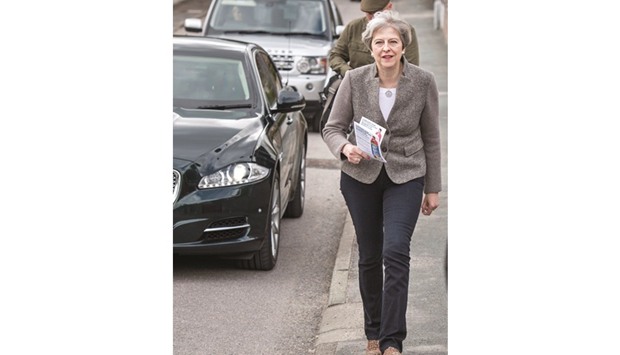Theresa May has all but confirmed she will drop the Conservative pledge not to raise three key taxes, as she ruled out higher VAT but declined to make a similar promise not to hike income tax and national insurance.
The prime minister said she did not want to make promises she was not absolutely confident she could keep, as she also signalled she would ditch the “triple-lock” formula by which the state pension would increase each year.
She was unable to promise that either of the commitments would continue, just two years after they formed a central plank of David Cameron’s 2015 election campaign.
In her first long interviews of this election campaign, the prime minister told the BBC’s Andrew Marr Show on Sunday she had “absolutely no plans to increase the level of tax” and an intention to lower taxes on working families.
But pressed about Cameron’s promise not to raise income tax, NI or VAT, she added: “I don’t want to make specific proposals on taxes unless I’m sure I can deliver on those.”
In a subsequent interview on ITV’s Peston on Sunday, she refined her position, saying: “We won’t raise VAT.”
May was in a similar position when asked about the triple-lock on state pensions – a promise that it would rise by a minimum of either 2.5%, the rate of inflation or average earnings growth, whichever is the largest. Labour has promised to keep the guarantee.
In a signal that it is to be dropped, potentially to pay for more social care funding, the prime minister said the state pension would continue to rise every year but “exactly how we calculate that rise” was for the manifesto.
She suggested there could be a comprehensive shakeup of social care funding, saying the government had to deal with “long-term issues about the ageing population”.
The prime minister was also tackled by Marr over her use of soundbites and slogans, but continued to use her favoured phrase about showing “strong and stable leadership”.
There has been speculation since the election was called that May would drop the tax lock promise and pensions triple lock to avoid tying her hands as the economy goes through the Brexit process.
However, John McDonnell, the shadow chancellor, said it was wrong for May to drop the triple lock formula and that he did not want to see pensioner incomes go backwards.
He also told ITV’s Peston on Sunday that Labour would pledge not to raise VAT and there would be no tax rises for middle or low earners, without giving a definition.
“We will end the tax giveaways to the corporations and the rich; we will demonstrate item by item how we can fund those and that will be about a fair taxation system. But let me give this assurance: there will be no increase in income tax for middle and low earners,” he said.
“We will protect middle and low earners. I will say also we will not increase VAT – and I want you to ask May that question because, if you remember, last time the Tories promised no increase in VAT and then they increased it afterwards. That’s a regressive tax. It falls on some of the poorest and middle earners as well, so that’s one guarantee we’re giving.”
Polling suggests May’s lead against Labour has been cut but she is still heading for a Conservative majority on the current trajectory.
Tim Farron, the LibDem leader, made a prediction yesterday that there would be a “colossal coronation” for May and therefore no hung parliament.
He urged voters to make the LibDems the official opposition, saying there was a “vacancy for leader of the opposition” because Labour backs Brexit, unlike his own party.
This would require an enormous electoral shift, given the party has just nine MPs and Labour has 229, while the SNP has 56.

Prime Minister Theresa May goes door-to-door campaigning for Andrew Bowie, Conservative candidate for West Aberdeenshire and Kincardine in the village of Banchory, in Aberdeenshire, north east of Scotland, during a general election campaign visit.
